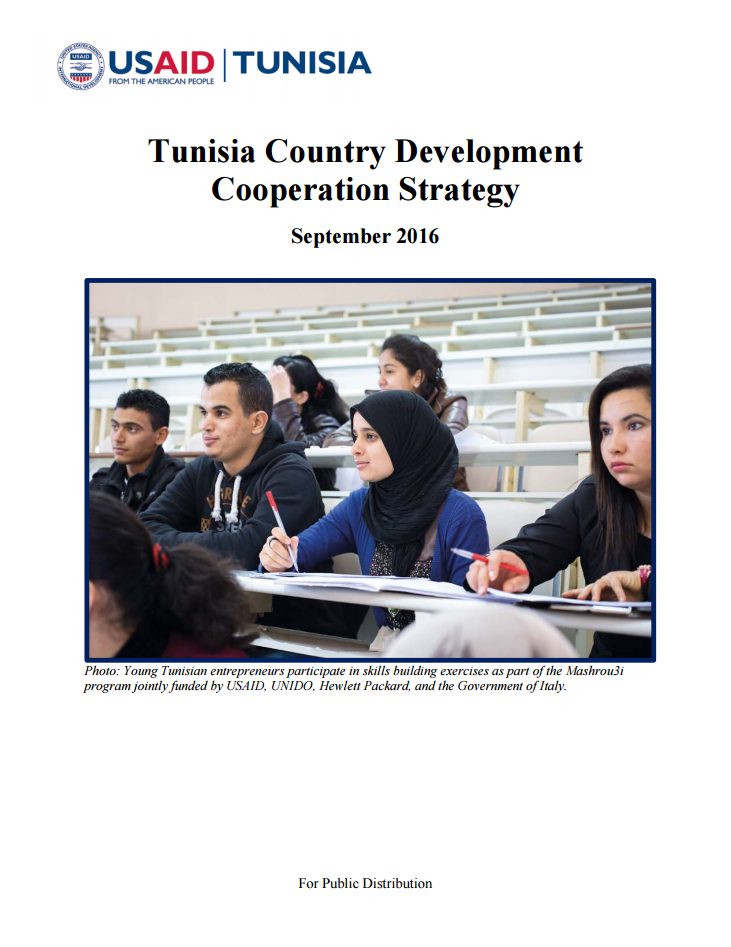Tunisia and the United States have a strong and continuing partnership with the shared objectives of furthering Tunisia’s democratization, strengthening the Tunisian economy, and improving security. This Country Development Cooperation Strategy (CDCS) embodies this spirit of partnership and local ownership.
Tunisia CDCS ![]() (pdf - 1 MB)
(pdf - 1 MB)
To become more open, inclusive, and socially integrated, Tunisia has identified the need to unleash its private sector and promote economic opportunities for all. Simultaneously, Tunisia seeks broader and more inclusive participation in governance in order to guarantee improved public sector accountability and service delivery.
The development objectives outlined in this CDCS represent USAID’s contribution over the next five years toward helping Tunisia surmount its economic and social challenges, as identified in the Government of Tunisia’s (GOT) proposed 2016-2020 Strategic Development Plan (SDP). As depicted graphically, USAID’s five-year strategy features two interlocking development objectives (DOs) - “Inclusive Private Sector Employment Increased” (DO 1) and “Social Cohesion Promoted through Democratic Consolidation” (DO 2) - with cross-cutting themes of youth, gender, and geographic integration. These elements will contribute to the goal of this CDCS, entitled “Inclusive Participation in Tunisia’s Socio-Economic Transformation Enabled.”
DO 1 assumes that if the government can maintain its overall macroeconomic balance and implement meaningful economic reforms that improve the business enabling environment, workforce skills, and public financial management systems, private sector firms will respond by increasing investment, expanding their business activity, and hiring more workers. Higher employment, in turn, will directly boost inclusion and enable much broader participation by increasing Tunisian confidence and economic hope for the future. DO 1 is driven by the need to promote inclusive, private sector-led growth that will reduce unemployment and contribute to Tunisia’s longer-term socio-economic transformation.
- Under Intermediate Result (IR) 1.1 (“Private Sector Demand for Skilled Labor Increased”), USAID will continue working primarily at the firm level, mainly with small and medium enterprises (SMEs) that have strong potential for expansion. This includes support for improved marketing, management, human resources, and other systems that promote firm growth and job creation.
- Under Intermediate Result 1.2 (“Workforce Skills Better Matched to Market Needs”), USAID will work with training institutions, workers, and existing labor-matching systems to strengthen the links between Tunisia’s education system and its private sector (including associations and chambers of commerce).
- Activities under IR 1.3 (“Accountable Public Financial Management Systems Enhanced”) will work with the Government of Tunisia to improve public financial management in tax collection and administration, transparency and accountability of public resources and budgets. As shown in the results framework, IR 1.3 ties directly to the “Accountable Governance” of IR 2.1.
DO 2 assumes that if Tunisia builds a more effective government that fosters collaboration between institutions and citizens while building community resilience, then improved social cohesion will contribute to a more democratic and inclusive society. Activities will be designed to create tangible results and provide positive and sustainable development.
- Activities under IR 2.1 (“Accountable Governance Strengthened”) will support more accountable and inclusive governance through citizen participation, while supporting the Government of Tunisia to effectively address citizen needs.
- IR 2.2 (“Community Resilience Strengthened in Select Geographic Areas”) will focus on delivering measurable impacts on populations in marginalized regions and addressing some of the drivers of violent extremism.
Gender, youth, and geographic integration are also critical considerations for promoting inclusiveness and social cohesion in Tunisia and will be factored into activities cutting across both DOs and all five IRs.









Comment
Make a general inquiry or suggest an improvement.